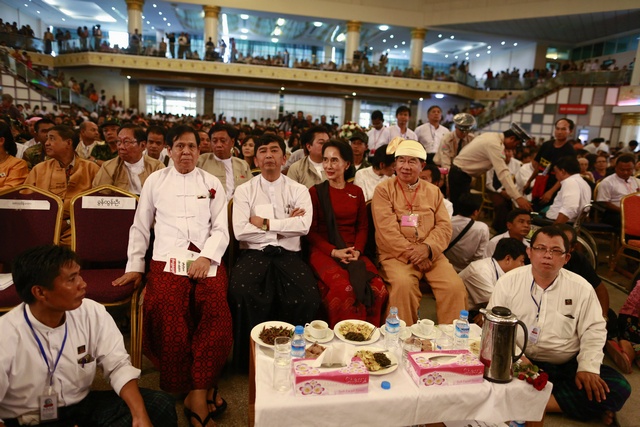Civil society groups convening in Rangoon to mark the 25th year anniversary of the 8888 uprisings released a declaration on Thursday calling for the establishment of a “democratic federal state”.
At the conclusion of the “Silver Jubilee for Four Eights Democracy Movement” conference at the Myanmar Convention Centre in Rangoon, the event’s organisers released a statement demanding the establishment of a federal state with “self-determination and equality”.
“The objective of the 8888 commemoration is to bring about peace and national reconciliation,” said 88 Generation Peace and Open Society’s Ko Ko Gyi, a famed student leader who helped organise the conference.
[related]
“For the past two days, we held workshop discussions with representatives from ethnic groups, political parties and academics and reached a decision agreed by all and today, we’ve concluded with a political framework for the future.”
To achieve this end, the civil society groups behind the silver jubilee event said the 2008 constitution should be amended or even redrafted in order to allow for the creation of a federal system of governance.
“The 2008 constitution does not guarantee such a democratic federal state,” read the statement published by the Convening Committee of the 8888 Silver Jubilee.
“We strongly believe there is a need to convene a convention that involves all national forces with the goal to achieve peace and national reconciliation.”
The demands follow similar calls made last week in Chiang Mai by a federation of eleven of Burma’s major armed groups who demanded that a new constitution be drafted to end decades of civil war.
The United Nationalities Federal Council, along with representatives from more than 40 ethnic organisations, political parties and civil society groups said they opposed amending the current constitution and said new a document should be drafted in order to allow for the creation of “a federal union of national states and nationalities states”.
While Thein Sein’s quasi-civilian government has been widely lauded for ushering in a wave of reforms that has brought the former pariah into the international fold, analysts warn that such changes remain fragile until the state’s problematic legal framework is addressed.
The current constitution was drafted by the military during a controversial convention in 2008. The document reserves 25 percent of parliamentary seats for the country’s armed forces and allocates a majority of the state’s power to a the central government.
Analysts have argued that while Thein Sein has succeeded in signing truces with a majority of the country’s rebel groups, sustainable peace will remain elusive until the government grants Burma’s ethnic minorities with more political rights.
Burma’s ethnic groups make up approximately 40 percent of the population and armed factions have fought the government for greater autonomy in one of the longest running civil conflicts in the world.



